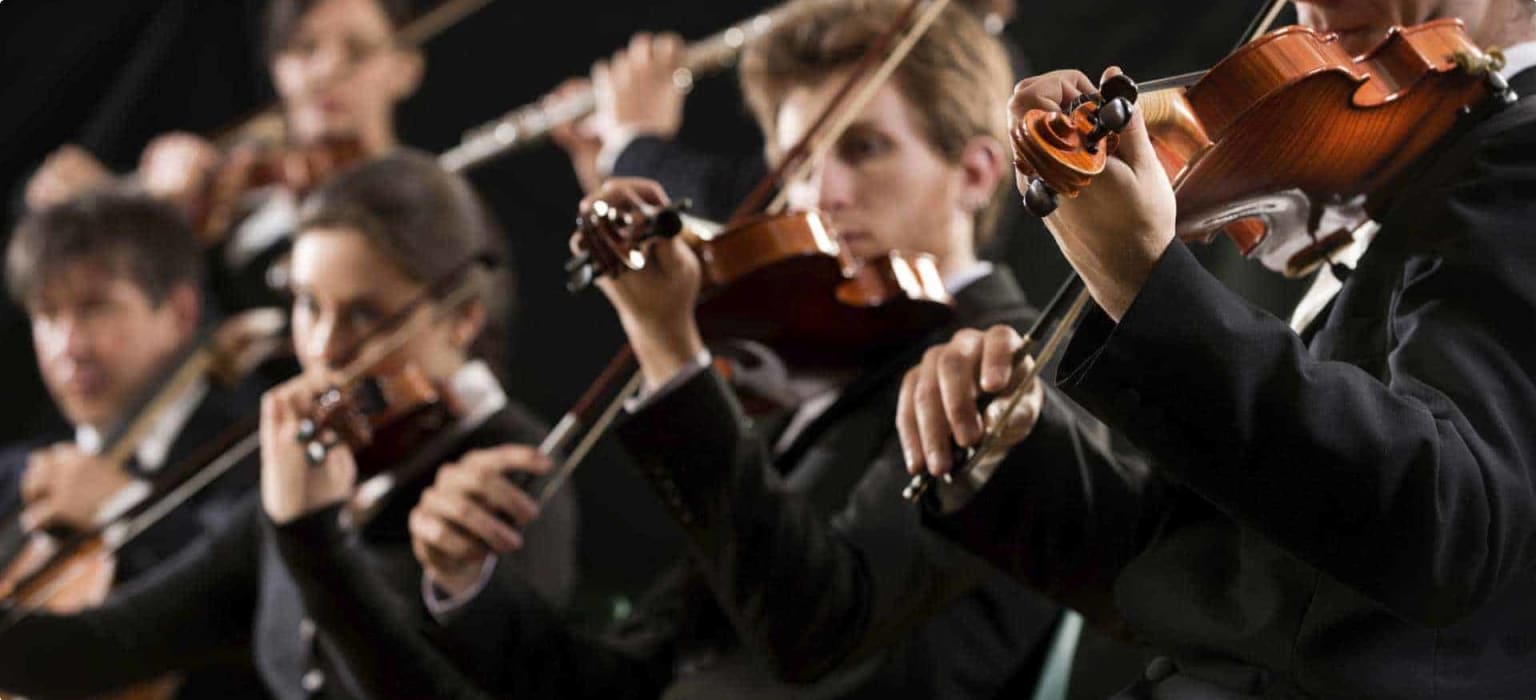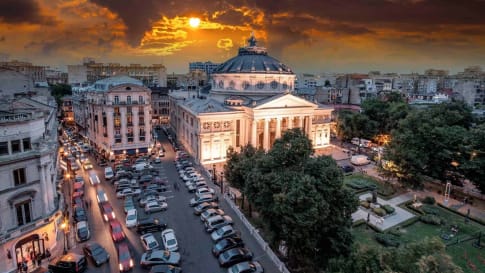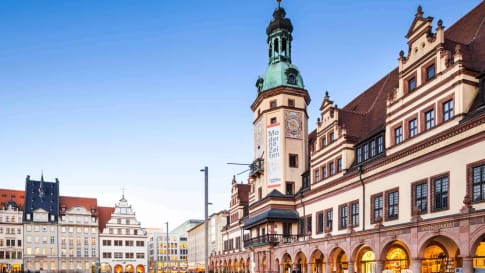Books on Johann Sebastian Bach
The life of Johann Sebastian Bach While Bach’s compositions receive worldwide acclaim, and are among perhaps the most famous and beloveds works of music, the man himself is somewhat of a mystery. Born in Eisenach,…
22 Mar 18 · 2 mins read

The life of Johann Sebastian Bach
While Bach’s compositions receive worldwide acclaim, and are among perhaps the most famous and beloveds works of music, the man himself is somewhat of a mystery. Born in Eisenach, Germany in 1685, to a family that already had significant music credentials, his use of counterpoint, harmonic and motivic organisation transformed the music of the 18th century and beyond. Though we may recognise Bach from his famous portrait, and be able to pick out one of his works from a few lines, we remain curious to know more about his life and influences. What led him to become one of the greatest composers in history? Our Bach small group tour is for lovers of music. We trace Bach’s footsteps, visiting the cities with which he is best associated. We will return with a greater understanding, and even deeper appreciation, of Johann Sebastian Bach.
Books on Johann Sebastian Bach
If you are interested in Bach, you might like to explore the following reading list. We have included 9 of the best books (and a film!) on Bach. Let us know what you think in the comments section below.
Johann Sebastian Bach: The Learned Musician (2013; 2000)
by Christoph Wolff
Although we have heard the music of J. S. Bach in countless performances and recordings, the composer himself still comes across only as an enigmatic figure in a single familiar portrait. As we mark the 250th anniversary of Bach’s death, author Christoph Wolff presents a new picture that brings to life this towering figure of the Baroque era. This engaging new biography portrays Bach as the living, breathing, and sometimes imperfect human being that he was, while bringing to bear all the advances of the last half-century of Bach scholarship.
Wolff demonstrates the intimate connection between the composer’s life and his music, showing how Bach’s superb inventiveness pervaded his career as musician, composer, performer, scholar, and teacher. And throughout, we see Bach in the broader context of his time: its institutions, traditions, and influences. With this highly readable book, Wolff sets a new standard for Bach biography. The Learned Musician was a finalist for the 2001 Pulitzer Prize in Biography.
Furthermore, this book is a favourite among Bach fans. To read real-life reviews on the website Goodreads, click here.
Bach: Music in the Castle of Heaven (2013)
by John Eliot Gardiner
Johann Sebastian Bach is one of the most unfathomable composers in the history of music. How can such sublime work have been produced by a man who (when we can discern his personality at all) seems so ordinary, so opaque-and occasionally so intemperate? John Eliot Gardiner grew up passing one of the only two authentic portraits of Bach every morning and evening on the stairs of his parents’ house, where it hung for safety during World War II. He has been studying and performing Bach ever since, and is now regarded as one of the composer’s greatest living interpreters. The fruits of this lifetime’s immersion are distilled in this remarkable book, grounded in the most recent Bach scholarship but moving far beyond it, and explaining in wonderful detail the ideas on which Bach drew, how he worked, how his music is constructed, how it achieves its effects — and what it can tell us about Bach the man.
Gardiner’s background as a historian has encouraged him to search for ways in which scholarship and performance can cooperate and fruitfully coalesce. This has entailed piecing together the few biographical shards, scrutinizing the music, and watching for those instances when Bach’s personality seems to penetrate the fabric of his notation. Gardiner’s aim is “to give the reader a sense of inhabiting the same experiences and sensations that Bach might have had in the act of music-making. This, I try to show, can help us arrive at a more human likeness discernible in the closely related processes of composing and performing his music”. It is very rare that such an accomplished performer of music should also be a considerable writer and thinker about it. John Eliot Gardiner takes us as deeply into Bach’s works and mind as perhaps words can. The result is a unique book about one of the greatest of all creative artists.
George B. Stauffer reviewed Why Bach Moves Us for the New York Review of Books. He writes that Gardiner “… forces us to rethink Bach’s life and how adversity and faith affected his vocal compositions. And it takes us inside his world, allowing us to see the works from the standpoint of composer, performer, and listener”. Peter Conrad also reviewed the book for The Guardian, and his article is available here.
The Cello Suites: J. S. Bach, Pablo Casals, and the Search for a Baroque Masterpiece (2011)
by Pablo Casal
One evening, journalist Eric Siblin attended a recital of Johann Sebastian Bach’s Cello Suites and began an epic quest that would unravel three centuries of intrigue, politics, and passion. Winner of the Mavis Gallant Prize for Nonfiction and the McAuslan First Book Prize, The Cello Suites weaves together three dramatic narratives: the disappearance of Bach’s manuscript in the eighteenth century; Pablo Casals’s discovery and popularization of the music in Spain in the late-nineteenth century; and Siblin’s infatuation with the suites in the present day. The search led Siblin to Barcelona, where Casals, just thirteen and in possession of his first cello, roamed the backstreets with his father in search of sheet music and found Bach’s lost suites tucked in a dark corner of a store. Casals played them every day for twelve years before finally performing them in public. Siblin pursues the mysteries that continue to haunt this music more than 250 years after its composer’s death: Why did Bach compose the suites for the cello, then considered a lowly instrument? What happened to the original manuscript? A seamless blend of biography and music history, The Cello Suites is a true-life journey of discovery, fueled by the power of these musical masterpieces.
Evening in the Palace of Reason: Bach Meets Frederick the Great in the Age of Enlightenment (2006)
by James R. Gaines
Johann Sebastian Bach created what may be the most celestial and profound body of music in history; Frederick the Great built the colossus we now know as Germany, and along with it a template for modern warfare. Their fleeting encounter in 1747 signals a unique moment in history where belief collided with the cold certainty of reason. Set at the tipping point between the ancient and modern world, Evening in the Palace of Reason captures the tumult of the eighteenth century, the legacy of the Reformation, and the birth of the Enlightenment in this extraordinary tale of two men.
Bach and the Meanings of Counterpoint: New Perspectives in Music History and Criticism (2008)
by David Yearsley
This book offers new interpretations of many of Bach’s late compositions which include complex musical techniques such as canon. These techniques held great significance for Bach and his contemporaries not only on account of the great skill they demanded but because of the meanings attached to them. Intricate musical devices were crucial to the Lutheran rituals of death and dying, to alchemy, to Enlightenment philosophies of stylistic change and musical progress, to musical representations of political power, and to the legacy of Bach into our own time.

Odyssey Traveller offers a specialised tour for lovers of Johann Sebastian Bach, which is guaranteed for departure in 2019. Our Bach Classical European Music Festival small group tour coincides with the Bach Festival. We enjoy seven breathtaking performances, and make our way through Germany as we trace the key sites associated with Bach’s life. If you have a keen interest in music, you might like to check out our list of specialised music tours. We also offer small group tours based on art and literature. Odyssey Traveller offers small group tours designed especially for seniors, and we welcome both couples and solo travellers. To keep in touch with Odyssey Traveller and receive information on our upcoming tours, please call or send an email. We’d love to hear from you!

Bach in Berlin: Nation and Culture in Mendelssohn's Revival of the St. Matthew Passion (2014)
by Celia Applegate
Bach’s St. Matthew Passion is universally acknowledged to be one of the world’s supreme musical masterpieces, yet in the years after Bach’s death it was forgotten by all but a small number of his pupils and admirers. The public rediscovered it in 1829, when Felix Mendelssohn conducted the work before a glittering audience of Berlin artists and intellectuals, Prussian royals, and civic notables. The concert soon became the stuff of legend, sparking a revival of interest in and performance of Bach that has continued to this day. Mendelssohn’s performance gave rise to the notion that recovering and performing Bach’s music was somehow “national work”. In 1865, Wagner would claim that Bach embodied “the history of the German spirit’s inmost life”. That the man most responsible for the revival of a masterwork of German Protestant culture was himself a converted Jew struck contemporaries as less remarkable than it does us today―a statement that embraces both the great achievements and the disasters of 150 years of German history.
In this book, Celia Applegate asks why this particular performance crystallized the hitherto inchoate notion that music was central to Germans’ collective identity. She begins with a wonderfully readable reconstruction of the performance itself and then moves back in time to pull apart the various cultural strands that would come together that afternoon in the Singakademie. The author investigates the role played by intellectuals, journalists, and amateur musicians (she is one herself) in developing the notion that Germans were “the people of music.” Applegate assesses the impact on music’s cultural place of the renewal of German Protestantism, historicism, the mania for collecting and restoring, and romanticism. In her conclusion, she looks at the subsequent careers of her protagonists and the lasting reverberations of the 1829 performance itself.
Bach's Dialogue with Modernity: Perspectives on the Passions (2012)
by John Butt
Providing a detailed analysis of Bach’s Passions, this 2010 book represents an important contribution to the debate about the culture of ‘classical music’, its origins, priorities and survival. The angles from which each chapter proceeds differ from those of a traditional music guide, by examining the Passions in the light of the mindsets of modernity, and their interplay with earlier models of thought and belief. While the historical details of Bach’s composition, performance and theological context remain crucial, the foremost concern of this study is to relate these works to a historical context that may, in some threads at least, still be relevant today. The central claim of the book is that the interplay of traditional imperatives and those of early modernity renders Bach’s Passions particularly fascinating as artefacts that both reflect and constitute some of the priorities and conditions of the western world.
Bach: a Passionate Life (2013)
by John Gardiner (writer and director).
The Cambridge Companion to Bach (1997)
by John Butt
The Cambridge Companion to Bach goes beyond a basic life-and-works study to provide a late-twentieth-century perspective on J. S. Bach, the man and composer. Benefiting from the insights and research of some of the most distinguished Bach scholars, this Companion covers cultural, social and religious contexts, surveys and analyzes Bach’s compositional style, traces his influence, and considers the performance and reception of his music through the succeeding generations.
J. S. Bach: Volumes 1 and 2 (2012; 1935)
by Albert Schweitzer
Independent of his international renown as a humanitarian, Albert Schweitzer is well known as a great musicologist; a reputation that rests largely upon this book. Schweitzer’s J. S. Bach is one of the great full-length studies of the composer, his life, and his work. Its influence on the subsequent performance of Bach’s music was enormous, and there is scarcely a later work on Bach which does not acknowledge a deep debt to Schweitzer’s. Grove’s Dictionary says of the book, “Schweitzer has probably been more quoted than any authority since Spitta.”
The first volume contains a virtual history of Protestant church music, examining the role of music in the early Protestant services of many European countries. Frequent allusions to the parallel development of art and poetry, to the leading philosophic and religious concepts of the time, and to events of contemporary history supplement and enrich the text. Narrowing the study to Germany, Schweitzer traces to their roots the forms used by Bach (with particular emphasis on the German chorale and the forms built around it), and assess the contributions of Schütz, Sheidt, Buxtehude, Pachelbel, and others of Bach’s predecessors. The volume includes a full account of Bach’s life, and discusses his works for organ, clavier, strings, and orchestra. Suggestions for performance include sections on bowing, on playing chords and double stops, and on the practice of ornamentation in Bach’s time.
Volume Two is concerned with Bach’s choral music — the chorales, cantatas, the Magnificat, the St. Matthew and St. John Passions, the motets, songs, oratorios, and masses. The illuminating analysis of these works, illustrated by hundreds of musical examples, is dominated by Schweitzer’s highly original theories regarding Bach’s pictorial representation of the text in the music, and the expressive motives Schweitzer has found and identified throughout Bach’s compositions. A long concluding chapter makes recommendations for performance on tempo, phrasing, accentuation, dynamics, and on the size and arrangement of the orchestra and choir.
Schweitzer’s J. S. Bach is among the definitive reference works on Bach and is high on the list of required reading for music students. Yet it is not a difficult or formidable work. It offers a stimulating, well-written narrative, with much in it to interest the music lover as well as the scholar.

Related Tours

16 days
Jun, MayBach Classical European Music Festival small group tours
Visiting Germany
Enjoy the best of Bach travelling with mature couples or solo travellers in a small group tour. We take time to appreciate not just the music but also to explore Bach's history and influences in Germany. The program spends 16 days visiting the locations that where influences on his life as well as attending the Bach Music festival in Leipzig.
From A$13,340 AUD
View Tour
9 days
Sep, AugDiscovering the Life of Beethoven | Small Group Tour
Visiting Germany
Travellers on this small group tour will have the chance to gain a deeper appreciation and understanding of Beethoven’s life and music. Beginning in the city of Bonn, where Beethoven was born, we visit the city precincts and buildings where Beethoven’s unique artistic sensibility was formed. In Vienna, we explore many of the concert halls and churches where his work was performed. In each city visited we attend performances of his work.
From A$10,895 AUD
View Tour
21 days
SepGeorge Enescu Festival small group tour of Romania
Visiting Romania
Discover the work and world of this neglected twentieth century musical giant on Odyssey's small escorted group tour. Explore Enescu’s native Romania before settling down to a feast of his music performed by a host of international stars in Bucharest and immerse yourself in his work with like minded people. Odyssey hopes to provide the group with the opportunity to attend some 30 concerts over 16 days. The next festival is September 2023.
From A$14,950 AUD
View Tour
20 days
JulItaly Puccini Festival small group Tour
Visiting Italy
The Puccini festival is an escorted tour complete with local guides as part of our small group travel program, we will also visit Rome, Siena, Florence, Lucca, Viareggio, Genoa, Milan, Verona, and Venice. Join like minded people on this European tour in Italy. For solo travellers there is a nominal single supplement charged.
From A$15,995 AUD
View Tour
days
JulRichard Wagner Ring Cycle, Leipzig | Small Group Tours Germany
Visiting Germany
The small group tour will see the opera performed in the city of Richard Wagner’s birth, Leipzig. Our tour starts in Dresden and we also visit Bayrouth and Munich. We will not only experience his music in these 4 operas, but also be shown the influences of culture and family on the extraordinary composer’s life.

22 days
DecOpera Tour Europe | Theatre-Opera-Ballet and Classical Music Small Group Tour for Seniors
Visiting England
This 22-day small group program visits the major arts centres of Hamburg, Amsterdam, Paris, and London. We travel in winter avoiding crowds and enjoy a different perspective of the places visited. At Odyssey Traveller we have sought to assemble entry and show tickets to what many will consider the best arts experiences available in those cities during each program.
From A$22,000 AUD
View Tour


